AWM41 1072 - [Official History, 1914-18 War: Records of Arthur G Butler:] Interviews containing accounts of Nursing experiences in the AANS [Australian Army Nursing Service]. These nurses were interviewed by Matron Kellett - Part 7
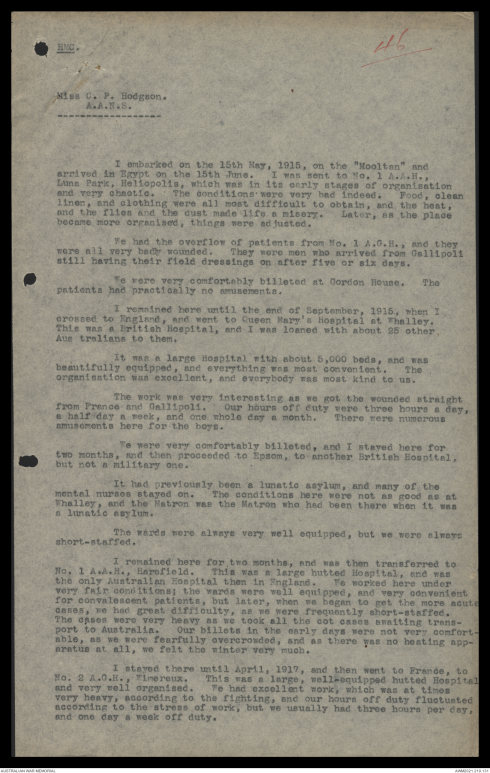
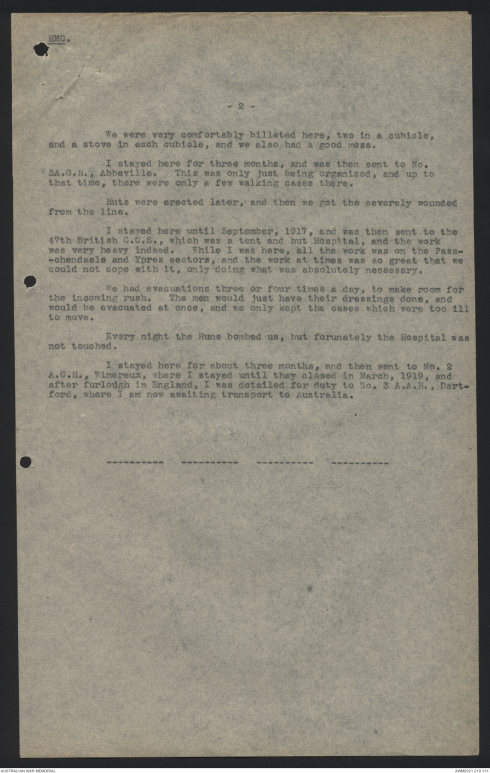
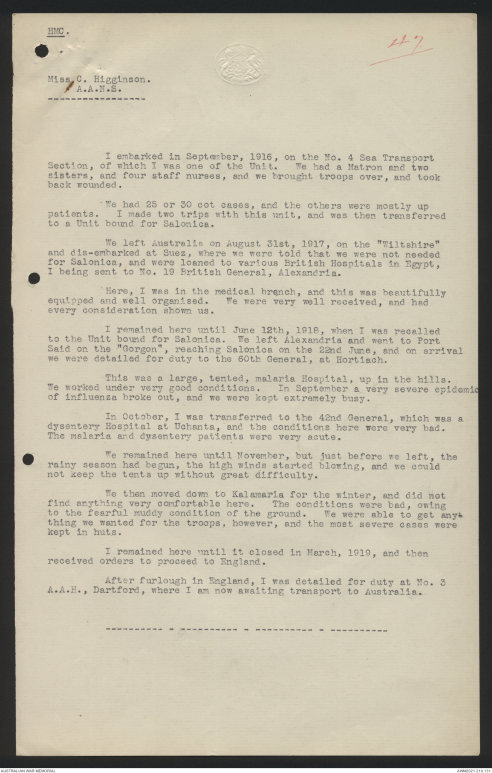
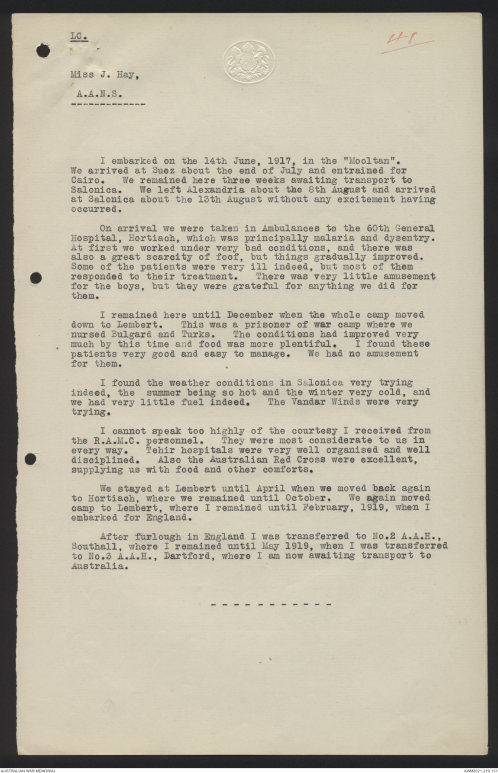
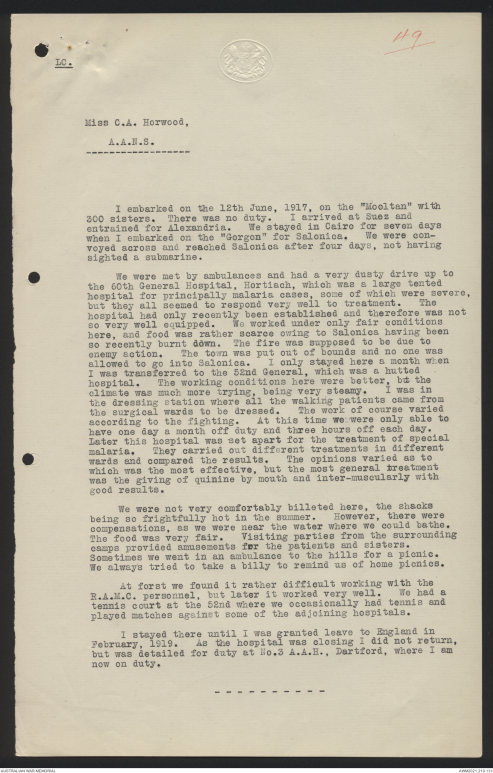
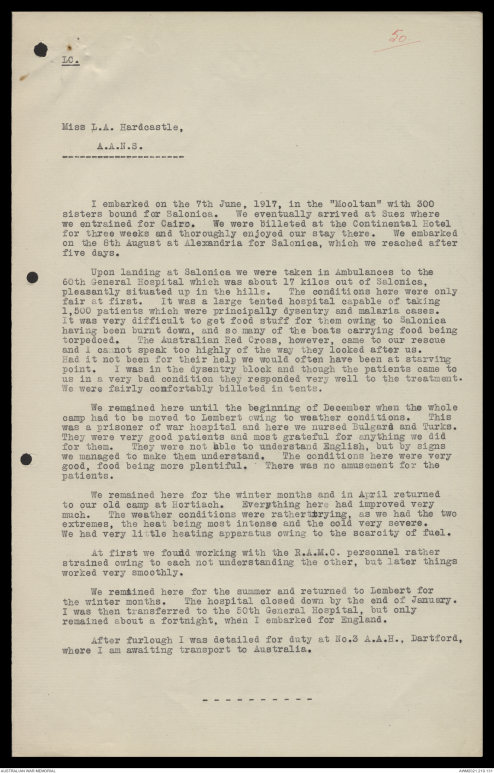
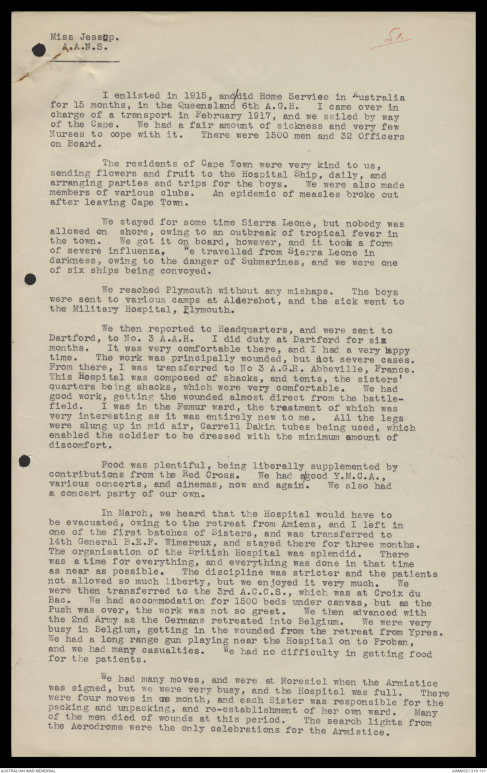
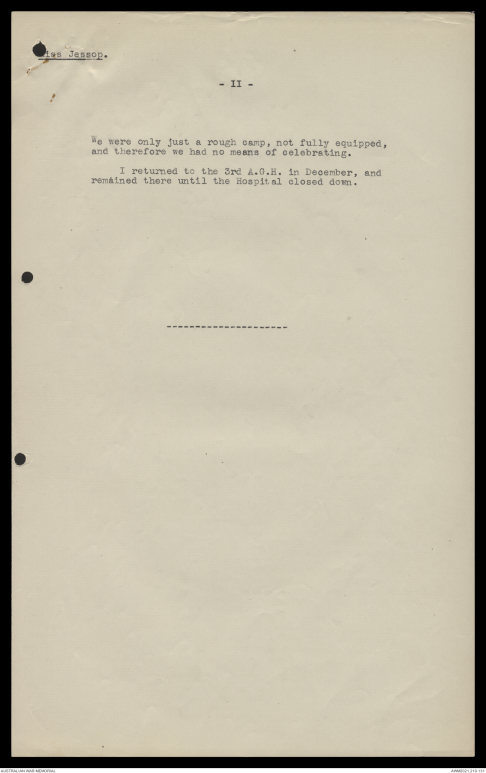
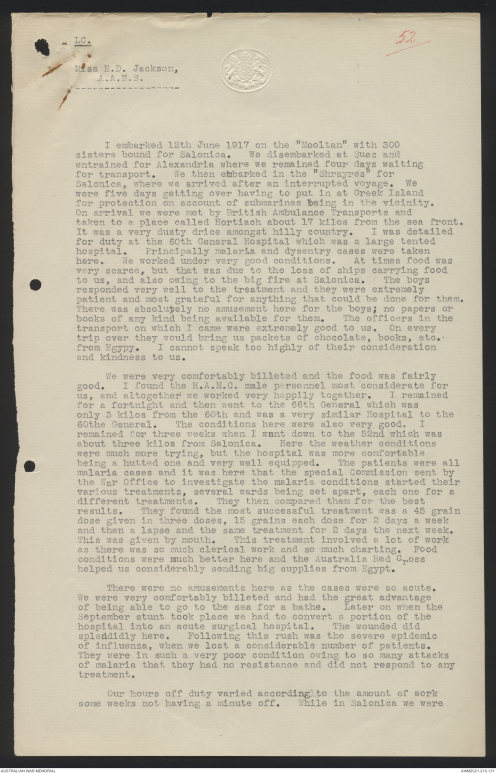
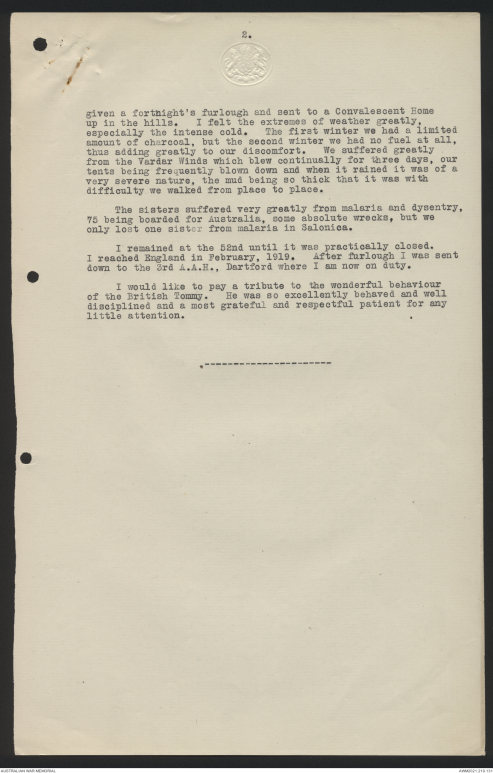
HMC.
46
Miss C.P.Hodgson.
A.A.N.S.
I embarked on the 15th May, 1915 , on the "Mooltan" and
arrived in Egypt on the 15th June. I was sent to No. 1 A.A.H.,
Luna Park, Heliopolis, which was in its early stages of organisation
and very chaotic. The conditions were very bad indeed. Food, clean
linen, and clothing were all most difficult to obtain, and the heat,
and the flies and the dust made life a misery. Later, as the place
became more organised, things were adjusted.
We had the overflow of patients from No. 1 A.G.H., and they
are all very badly wounded. They were men who arrived from Gallipoli
still having their field dressing on after five or six days.
We were very comfortably billeted at Gordon House. The
patients had practically no amusements.
I remained here until the end of September, 1915, when I
crossed to England, and went to Queen Mary's Hospital at Whalley.
This was a British Hospital, and I was loaned with about 25 other
Aus tralians to them.
It was a large Hospital with about 5,000 beds, and was
beautifully equipped, and everything was most convenient. The
organisation was excellent, and everybody was most kind to us.
The work was very interesting as we got the wounded straight
from France and Gallipoli. Our hours off duty were three hours a day,
a half day a week, and one whole day a month. There were numerous
amusements here for the boys.
We were very comfortably billeted, and I stayed here for
two months, and then proceeded to Epsom, to another British Hospital,
but not a military one.
It had previously been a lunatic asylum, and many of the
mental nurses stayed on. The conditions here were not as good as at
Whalley, and the Matron was the Matron who had been there when it was
a lunatic asylum.
The wards were always very well equipped, but we were always
short-staffed.
I remained here for two months, and was then transferred to
No. 1 A.A.H., Harefield. This was a large hutted Hospital, and was
the only Australian Hospital then in England. We worked here under
very fair conditions; the wards were well equipped, and very convenient
for convalescent patients, but later, when we began to get more acute
cases, we had great difficulty, as we were frequently short-staffed.
The cases were very heavy as we took all the cot cases awaiting transport
to Australia. Our billets in the early days were not very comfortable,
as we were fearfully overcrowded, and as there was no heating apparatus
at all, we felt the winter very much.
I stayed there until April, 1917, and then went to France, to
No. 2 A.G.H, Wimereux. This was a large, well-equipped hutted Hospital
and very well organised. We had excellent work, which was at times
very heavy, according to the fighting, and our hours off duty fluctuated
according to the stress of work, but we usually had three hours per day,
and one day a week off duty.
HMC.
- 2 -
We were very comfortably billeted here, two in a cubicle,
and a stove in each cubicle, and we also had a good mess.
I stayed here for three months, and was then sent to No.
3A.G.H., Abbeville. This was only just being organised, and up to
that time, there were only a few walking cases there.
Huts were erected later, and then we got the severely wounded
from the line.
I stayed here until September, 1917, and was then sent to the
47th British C.G.S., which will a tent and hut Hospital, and the work
was very heavy indeed. While I was here, all the work was on the Passchendaele
and Ypres sectors, and the work at times was so great that we
could not cope with it, only doing what was absolutely necessary.
We had evacuations three or four times a day, to make room for
the incoming rush. The men would just have their dressings done, and
would be evacuated at once, and we only kept the cases which were too ill
to move.
Every night the Huns bombed us, but forunately the hospital was
not touched.
I stayed here for about three months, and then went to No. 2
A.G.H., Wimereux, where I stayed until they closed in March, 1919, and
after furlough in England, I was detailed for duty to No. 3 A.A.H., Dartford,
where I am now waiting transport to Australia.
HMC.
47
Miss C. Higginson.
A.A.N.S.
I embarked in September, 1916, on the No. 4 Sea Transport
Section, of which I was one of the Unit. We had a Matron and two
sisters, and four staff nurses, and we brought troops over, and took
back wounded.
We had 25 or 30 cot cases, and the others were mostly up
patients. I made two trips with this unit, and then transferred
to a Unit bound for Salonica.
We left Australia on August 31st, 1917, under "Wiltshire"
and dis-embarked at Suez, where we were told that we were not needed
for Salonica, and were loaned to various British Hospitals in Egypt,
I being sent to No. 19 British General, Alexandria.
Here, I was in the medical branch, and this was beautifully
equipped and well organised. We were very well received, and had
every consideration shown us.
I remained here until June 12th, 1918, when I was recalled
to the Unit bound for Salonica. We left Alexandria and went to Port
Said on the "Gorgon", reaching Salonica on the 22nd June, and on arrival
we were detailed for duty to the 60th General, at Hortiach.
This was a large, tented, malaria Hospital, up in the hills.
We worked under very good conditions. In September the very severe epidemic
of influenza broke out, and we were kept extremely busy.
In October, I was transferred to the 42nd General, which was a
dysentery Hospital at Uchanta, and the condition here were very bad.
The malaria and dysentery patients were very acute.
We remained here until November, but just before we left, the
rainy season had begun, the high winds started blowing, and we could
not keep the tent up without great difficulty.
We then moved down to Kalamaria for the winter, and did not
find anything very comfortable here. The conditions were bad, owing
to the fearful muddy condition of the ground. We were able to get anything
we wanted for the troops, however, and the most severe cases were
kept in huts.
I remained here until it closed in March, 1919, and then
received orders to proceed to England.
After furlough in England, I was detailed for duty at No. 3
A.A.H., Dartford, where I am now awaiting transport to Australia.
LC.
41
Miss J. Hay
A.A.N.S.
I embarked on the 14th June, 1917, in the "Mooltan".
We arrived at Suez about the end of July and entrained for
Cairo. We remained here three weeks awaiting transport to
Salonica. We left Alexandria about the 8th August and arrived
at Salonica about the 13th August without any excitement having
occurred.
On arrival we were taken in Ambulances to the 60th General
Hospital, Hortiach, which was principally malaria and dysentery.
At first we worked under very bad conditions, and there was
also a great scarcity of foof, but things gradually improved.
Some of the patients were very ill indeed, but most of them
responded to their treatment. There was very little amusement
for the boys, that they were grateful for anything we did for
them.
I remained here until December when the whole camp moved
down to Lembert. This was a prisoner of war camp where we
nursed Bulgard and Turks. The conditions had improved very
much by this time and food was more plentiful. I found these
patients very good and easy to manage. We had no amusement
for them.
I found the weather conditions in Salonica very trying
indeed, the summer being so hot and the winter very cold, and
we had very little fuel indeed. The Vandar Winds were very
trying.
I cannot speak too highly of the courtesy I received from
the R.A.M.C. personnel. They were most considerate to us in
every way. Tehir hospitals were very well organised and well
disciplined. Also the Australian Red Cross were excellent,
supplying us with food and other comforts.
We stayed at Lembert until April when we moved back again
to Hortiach, where we remained until October. We again moved
camp to Lembert, where I remained until February, 1919, when I
embarked for England.
After furlough in England I was transferred to No. 2 A.A.H.,
Southall, where I remained until May 1919, when I was transferred
to No. 3 A.A.H., Dartford, where I am now awaiting transport to
Australia.
LC.
49
Miss C.A. Horwood,
A.A.N.S.
I embarked on the 12th June, 1917, on the "Mooltan" with
300 sisters. There was no duty. I arrived at Suez and
entrained for Alexandria. We stayed in Cairo for seven days
when I embarked on the "Gorgon" for Salonica. We were
convoyed across and reached Salonica after four days, not having
sighted a submarine.
We were met by ambulances and had a very dusty drive up to
the 60th General Hospital, Hortiach, which was a large tented
hospital for principally malaria cases, some of which were severe,
but they all seemed to respond very well to treatment. The
hospital and only recently been established and therefore was not
so very well equipped. We worked under only fair conditions
here, and food was rather scarce owing to Salonica having been
so recently burnt down. The fire was supposed to be due to
enemy action. The town was put out of bounds and no one was
allowed to go into Salonica. I only stayed here a month when
I was transferred to the 52nd General, which was a hutted
hospital. The working conditions here were better, but the
climate was much more trying, being very steamy. I was in
the dressing station where all the walking patients came from
the surgical wards to be dressed. The work of course varied
according to the fighting. At this time we were only able to
have one day a month off duty and three hours off each day.
Later this hospital was set apart for the treatment of special
malaria. They carried out different treatments in different
wards and compared the results. The opinions varied as to
which was the most effective, but the most general treatment
was the giving of quinine by mouth and inter-muscularly with
good results.
We were not very comfortably billeted here, the shacks
being so frightfully hot in the summer. However, there were
compensations, as we were near the water where we could bathe.
The food was very fair. Visiting parties from the surrounding
camps provided amusements for the patients and sisters.
Sometimes we went in an ambulance to the hills for a picnic.
We always tried to take a billy to remind us of home picnics.
At forst we found it rather difficult working with the
R.A.M.C. personnel, but later it worked very well. We had a
tennis court at the 52nd where we occasionally had tennis and
played matches against some of the adjoining hospitals.
I stayed there until I was granted leave to England in
February, 1919. As the hospital was closing I did not return,
but was detailed for duty at No.3 A.A.H., Dartford, where I am
on now on duty.
LC.
50
Miss L.A. Hardcastle,
A.A.N.S.
I embarked on the 7th June, 1917, in the "Mooltan" with 300
sisters bound for Salonica. We eventually arrived at Suez where
we entrained for Cairo. We were billeted with the Continental Hotel
for three weeks and thoroughly enjoyed our stay there. We embarked
on the 8th August at Alexandria for Salonica, which we reached after
five days.
Upon landing at Salonica we were taken in Ambulances to the
60th General Hospital which was about 17 kilos out of Salonica,
pleasantly situated up in the hills. The conditions here were only
fair at first. It was a large tented hospital capable of taking
1,500 patients which were principally dysentery and malaria cases.
It was very difficult to get food stuff for them owing to Salonica
having been burnt down, and so many of the boats carrying food being
torpedoed. The Australian Red Cross, however, came to our rescue
and I cannot speak too highly of the way they looked after us.
Had it not been for their help we would often have been at starving
point. I was in dysentery block and though the patients came to
us in a very bad condition they responded very well to the treatment.
We were fairly comfortably billeted in tents.
We remained here until the beginning of December when the whole
camp had to be moved to Lembert owing to weather conditions. This
was a prisoner of war hospital and here we nursed Bulgard and Turks.
They were very good patient and most grateful for anything we did
for them. They were not able to understand English, but by signs
we managed to make them understand. The conditions here were very
good, food being more plentiful. There was no amusement for the
patients.
We remained here for the winter months and in April returned
to our old camp at Hortiach. Everything here had improved very
much. The weather conditions were rather trying, as we had the two
extremes, the heat being most intense and the cold very severe.
We had very little heating apparatus owing to the scarcity of fuel.
At first we found working with the R.A.M.C. personnel rather
strained owing to each not understanding the other, but later things
worked very smoothly.
We remained here for the summer and returned to Lembert for
the winter months. The hospital closed down by the end of January.
I was then transferred to the 50th General Hospital, but only
remained about fortnight, when I embarked for England.
After furlough I was detailed for duty and No.3 A.A.H., Dartford,
where I am awaiting transport to Australia.
51
Miss Jessup,
A.A.N.S.
I enlisted in 1915, and/did Home Service in Australia
for 15 months, in the Queensland 6th A.G.H. I came over in
charge of a transport in February 1917, and we sailed by way
of the Cape. We had a fair amount of sickness and very few
Nurses to cope with it. There were 1500 men and 32 Officers
on Board.
The residents of Cape Town were very kind to us,
sending flowers and fruit to the Hospital Ship, daily, and
arranging parties and trips for the boys. We were also made
members of various clubs. An epidemic of measles broke out
after leaving Cape Town.
We stayed for some time Sierra Leone, but nobody was
allowed on shore, owing to an outbreak of tropical fever in
the town. We got it on board, however, and it took a form
of severe influenza. We travelled from Sierra Leone in
darkness, owing to the danger of Submarines, and we were one
of six ships being convoyed.
We reached Plymouth without any mishaps. The boys
were sent to various camps at Aldershot, and the sick went to
the military hospital, Plymouth.
We then reported to Headquarters, and were sent to
Dartford, to No.3 A.A.H. I did duty at Dartford for six
months. It was very comfortable there, and I had a very happy
time. The work was principally wounded, but not severe cases.
From there, I was transferred to No 3 A.G.H. Abbeville, France.
This Hospital was composed of shacks, and tents, the sisters'
quarters being shacks, which were very comfortable. We had
good work, getting the wounded almost direct from the battlefield.
I was in the Femur ward, the treatment of which was
very interesting as it was entirely new to me. All the legs
were slung up in mid air, Carrell Dakin tubes being used, which
enabled the soldier to be dressed with the minimum amount of
discomfort.
Food was plentiful, being literally supplemented by
contributions from the Red Cross. We had a/good Y.M.C.A.,
various concerts, and cinemas, now and again. We also had
a concert party of our own.
In March, we heard that the Hospital would have to
be evacuated, owing to the retreat from Amiens, and I left in
one of the first batches of Sisters, and was transferred to
14th General B.E.F. Wimereux, and stayed there for three months.
The organisation of the British Hospital was splendid. There
was a time for everything, and everything was done in that time
as near as possible. The discipline was stricter and the patients
not allowed so much liberty, but we enjoyed it very much. We
were then transferred to the 3rd A.C.C.S., which was at Croix du
Bac. We had accommodation for 500 beds under canvas, but as the
Push was over, the work was not so great. We then advanced with
the 2nd army as the Germans retreated into Belgium. We were very
busy in Belgium, getting in the wounded from the retreat from Ypres.
We had a long range gun playing near the Hospital on to Proban,
and we had many casualties. We had no difficulty in getting food
for the patients.
We had many moves, and were at Moresiel when the Armistice
was signed, but we were very busy, and the Hospital was full. There
were four moves in one month, and each Sister was responsible for the
packing and unpacking, and re-establishment of her own ward. Many
of the men died of wounds at this period. The search lights from the
Aerodrome were the only celebrations for the Armistice.
Miss Jessop.
-II-
We were only just a rough camp, not fully equipped,
and therefore we had no means of celebrating.
I returned to the 3rd A.G.H. in December, and
remained there until the Hospital closed down.
52
LC.
Miss E.D. Jackson
A.A.N.S
I embarked 12th June 1917 on the "Mooltan" with 300
sisters bound for Salonica. We disembarked at Suez and
entrained for Alexandria where we remained four days waiting
for transport. We then embarked in the "Shrayres" for
Salonica, where we arrived after an interrupted voyage. We
were five days getting over having to put in at Greek Island
for protection on account of submarines being in the vicinity.
On arrival we were met by British Ambulance Transports and
taken to a place called Hortiach about 17 kilos from the sea front.
It was a very dusty drice amongst hilly country. I was detailed
for duty at the 60th General Hospital which was a large tented
hospital. Principally malaria and dysentry cases were taken
here. We worked under very good conditions. At times food was
very scarce, but that was due to the loss of ships carrying food
to us, and also owing to the big fire at Salonica. The boys
responded very well to the treatment and they were extremely
patient and most grateful for anything that could be done for them.
There was absolutely no amusement here for the boys; no papers or
books of any kind being available for them. The officers in the
transport on which I came were extremely good to us. On every
trip over they would bring us packets of chocolate, books, etc.
from Egypy. I cannot speak too highly of their consideration
and kindness to us.
We were very comfortably billeted and the food was fairly
good. I found the R.A.M.C. male personnel most considerate for
us, and altogether we worked very happily together. I remained
for a fortnight and then went to the 66th General which was
only 3 kilos from the 60th and was a very similar Hospital to the
60the General. The conditions here were also very good. I
remained for three weeks when I went down to the 52nd which was
about three kilos from Salonica. Here the weather conditions
were much more trying, but the hospital was more comfortable
being a hutted one and very well equipped. The patients were all
malaria cases and it was here that the special Commission sent by
the War Office to investigate the malaria conditions started their
various treatments, several wards being set apart, each one for a
different treatments. They then compared them for the best
results. They found the most successful treatment was a 45 grain
dose given in three doses, 15 grains each dose for 2 days a week
and then a lapse and the same treatment for 2 days in the next week.
This was given by mouth. This treatment involved a lot of work
as there was so much clerical work and so much charting. Food
conditions were much better here and the Australia Red Cross
helped us considerably sending big supplies from Egypt.
There were no amusements here as the cases were so acute.
We were very comfortably billeted and had the great advantage
of being able to go to the sea for a bathe. Later on when the
September stunt took place we had to convert a portion of the
hospital into an acute surgical hospital. The wounded did
splendidly here. Following this rush was the severe epidemic
of influenza, when we lost a considerable number of patients.
They were in such a very poor condition owing to so many attacks
of malaria that they had no resistance and did not respond to any
treatment.
Our hours off duty varied according to the amount of work
some weeks not having a minute off. While in Salonica we were
2.
given a fortnight's furlough and sent to a Convalescent Home
up in the hills. I felt the extremes of weather greatly,
especially the intense cold. The first winter we had a limited
amount of charcoal, but the second winter we had no fuel at all,
thus adding greatly to our discomfort. We suffered greatly
from the Vardar Winds which blew continually for three days, our
tents being frequently blown down and when it rained it was of a
very severe nature, the mud being so thick that it was with
difficulty we walked from place to place.
The sisters suffered very greatly from malaria and dysentry,
75 being boarded for Australia, some absolute wrecks, but we
only lost one sister from malaria in Salonica.
I remained at the 52nd until it was practically closed.
I reached England in February, 1919. After furlough I was sent
down to the 3rd A.A.H., Dartford where I am now on duty.
I would like to pay a tribute to the wonderful behaviour
of the British Tommy. He was so excellently behaved and well
disciplined and a most grateful and respectful patient for any
little attention.
 Sam scott
Sam scottThis transcription item is now locked to you for editing. To release the lock either Save your changes or Cancel.
This lock will be automatically released after 60 minutes of inactivity.